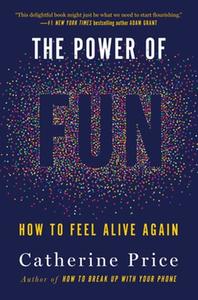
|
|
| photo: Colin Lenton | |
Catherine Price is a writer and speaker whose work considers the surprising science behind things we often take for granted, such as vitamins, cell phones and even fun. Price's How to Break Up with Your Phone is the handbook for stepping away from all-consuming devices, and her new book, The Power of Fun: How to Feel Alive Again (reviewed below), helps readers identify experiences that will harness the power of fun.
Let's start with the question you ask at the start of the book: When was the last time you had fun?
Ah, yes, [laughing] I'm happy to report that I've had a lot of fun and in totally unexpected contexts. I went to the dermatologist this morning, and--
Not typically fun, right?
Not typically fun, no. But my dermatologist is very easy-to-laugh, and we had this fun conversation joking around about my sensitive skin. I recognize that doesn't sound fun, but it was! For a more traditional example of fun, I went to a finger-picking guitar class last night, where the fun came from making music together and interacting with people who have become a real community for me. Both, though very different, were examples of what I call True Fun.
How has your understanding of fun changed through the process of writing this book?
When I first started this project, I was more focused on what I would call Peak Fun experiences, those moments you will remember for years. What I hadn't recognized was that I was having moments of Everyday Fun that I wasn't appreciating or labeling as such. Once I put effort into noticing those smaller moments in my everyday life, I realized I have a lot more micro-moments of fun sprinkled throughout my days than I ever would have thought. I'm not going to remember that dermatology appointment for the rest of my life, but the fun we shared was worth paying attention to.
You define "True Fun" as "the confluence of playfulness, connection, and flow." If you were forced to prioritize only one, which would it be?
Obviously, I love all three states, and each of them is really great on its own. Even if you don't hit all three at once, aiming at playfulness, connection or flow ["a term used in psychology to describe experiences in which you are fully engrossed... to the point that you lose track of the passage of time"] is going to set your life in a better, more engaged direction. But if I had to pick one, I would say flow because you can't really connect or engage in playfulness if you're not in flow with someone. Anything that distracts us is going to pull us out of flow, so I think that flow is the foundation of fun, and our biggest task is to remove the obstacles that keep us from flow. For most of us, that obstacle is our phones.
 In the book, you unpack the relationship between time and money, work and consumerism, but the obvious critiques to your argument are often tied to these things: How can I focus on fun if I have to work multiple jobs just to stay afloat? If I can't afford the things I find "fun," does that mean I'm doomed to a life unlived?
In the book, you unpack the relationship between time and money, work and consumerism, but the obvious critiques to your argument are often tied to these things: How can I focus on fun if I have to work multiple jobs just to stay afloat? If I can't afford the things I find "fun," does that mean I'm doomed to a life unlived?
There is, firstly, an assumption that your basic needs are met. You're not going to be able to prioritize fun if you don't know where your next meal is coming from, or if you don't know how you're going to pay the rent. Maslow's Hierarchy of Needs is a pyramid structure that outlines steps to reach your full human potential, and the bottom tier is those essential needs: food, shelter, safety and security. Moving up the pyramid, you can focus on emotional connections and a feeling of purpose and then self-actualization, or being your true, authentic self. What my research uncovered was that fun isn't just a side effect of those things; fun is the cause. The more fun you're having, the stronger your relationships are going to be, and the more you're going to feel like your true, authentic self because you'll be fully present in your own life.
We've been manipulated into thinking we need to have a lot of material possessions to have fun. It's just not true. We're encouraged to buy new gadgets that are marketed to us as fun, when in fact, we could have a lot more fun for a lot less money if we took a step back and asked ourselves "what are the people and situations and activities where I find fun the most frequently?" and work to build those into our lives.
Do you think that if today's adults were to embrace fun, they could aid the next generation in choosing a more enriched life?
There is a mental health crisis with America's youth right now. And in large part, that's due to perfectionism and the pressure to perform. Many kids aren't being given the chance to do things just for the sake of enjoyment. If adults can let go of that mentality, we would both enjoy our lives more in the present and also show them a different way to live. I think you'd have people who are happier and more confident and empowered to make positive change in the world. We all have this potential for growth and experience, but we tend to shut ourselves off from it as we get older. When we prioritize fun, we often find ourselves as beginners again, continuing to grow and evolve.
Throughout the book, you encourage your readers to see themselves as unfinished people who still have things to learn and do.
Yes, we're not finished! Why not keep changing and learning? So much of what we do, whether it's throwing ourselves into work or exercising or entertainment, it's to avoid the existential thoughts that come in moments of stillness. True Fun is the antidote to all that.
Your website invites readers to take a Fun Personality quiz, which made me wonder: What's your fun personality?
I'm a Fun Organizer, someone who organizes activities to create fun for other people, which can be great, but the downside is you get so wrapped up in the logistics that you forget to have fun yourself. The other types are the Fun Generator, who bring the fun no matter the situation. And then, the Fun Accelerator--not the source of fun themselves, but their presence accelerates the fun. The Fun Seeker finds fun events or activities to try. Of course, each of us can have more than one personality type, but the quiz gives readers ways to connect or discuss these ideas together.
Though the book has a lightheartedness about it, it could also be therapeutic, especially for those who don't see themselves in any of those personalities. There may be readers who need to be reminded of the power of fun in their lives, and they may just rediscover themselves in the process.
That really is my hope. The first section is "Fun, Seriously" because fun is really powerful and should be taken seriously. It has the power to change people's lives, and the world, for the better. --Sara Beth West, librarian and freelance reviewer

